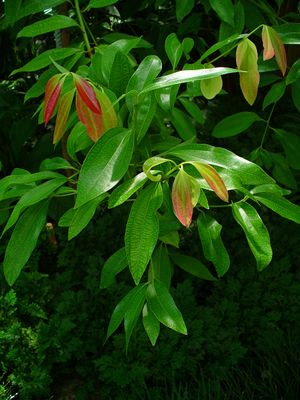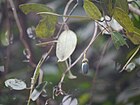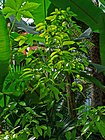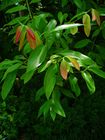Note: This is a project under development. The articles on this wiki are just being initiated and broadly incomplete. You can Help creating new pages.
Cinnamomum verum - Darusita
Darusita is a small evergreen tree 10–15 meters tall. It is native to Sri Lanka and South India. The bark is widely used as a spice due to its distinct odour. In India it is also known as "Daalchini".
Contents
- 1 Uses
- 2 Parts Used
- 3 Chemical Composition
- 4 Common names
- 5 Properties
- 6 Habit
- 7 Identification
- 8 List of Ayurvedic medicine in which the herb is used
- 9 Where to get the saplings
- 10 Mode of Propagation
- 11 How to plant/cultivate
- 12 Commonly seen growing in areas
- 13 Photo Gallery
- 14 References
- 15 External Links
Uses
Diabetes, Cholesterol, Cold, Common cold, Skin eruptions, Flu, Pimples, Headaches.
Parts Used
Chemical Composition
The presence of a wide range of essential oils, such as trans-cinnamaldehyde, cinnamyl acetate, eugenol, L-borneol[1]
Common names
| Language | Common name |
|---|---|
| Kannada | Daalchini, Daalchinni chakke |
| Hindi | Dalcini, Darucini |
| Malayalam | Carua, Elavangam |
| Tamil | Cannalavangapattai, Ilavangam |
| Telugu | Daalchinni chakke, Lavangamu |
| Marathi | NA |
| Gujarathi | NA |
| Punjabi | NA |
| Kashmiri | NA |
| Sanskrit | Darusita, tvak |
| English | Cinnamon |
Properties
Reference: Dravya - Substance, Rasa - Taste, Guna - Qualities, Veerya - Potency, Vipaka - Post-digesion effect, Karma - Pharmacological activity, Prabhava - Therepeutics.
Dravya
Rasa
Tikta (Bitter), Katu (Pungent), Madhura (Sweet)
Guna
Laghu (Light), Ruksha (Dry), Tikshna (Sharp)
Veerya
Ushna (Hot)
Vipaka
Katu (Pungent)
Karma
Vata, Kapha
Prabhava
Habit
Identification
Leaf
| Kind | Shape | Feature |
|---|---|---|
| Simple | Foliage Color is Light Green, Dark Green, Pink and Foliage Texture is Medium and Foliage Sheen is Glossy |
Flower
| Type | Size | Color and composition | Stamen | More information |
|---|---|---|---|---|
| Unisexual | 2-4cm long | White, Light Yellow | 1 | Flower Interest is Insignificant and these are the Fragrant Flowers |
Fruit
| Type | Size | Mass | Appearance | Seeds | More information |
|---|---|---|---|---|---|
| Rounded | Black | Fruit is edible | Fruites are fragment | single | {{{6}}} |
Other features
List of Ayurvedic medicine in which the herb is used
Where to get the saplings
Mode of Propagation
How to plant/cultivate
Cinnamon can be found at elevations up to 2,000 metres, but for commercial harvesting does best at low altitudes below 500 metres[3]
Commonly seen growing in areas
Ocean islands, Seychelles, Lowland tropical forests.
Photo Gallery
References
External Links
- Ayurvedic Herbs known to be helpful to treat Diabetes
- Ayurvedic Herbs known to be helpful to treat Cholesterol
- Ayurvedic Herbs known to be helpful to treat Cold
- Ayurvedic Herbs known to be helpful to treat Common cold
- Ayurvedic Herbs known to be helpful to treat Skin eruptions
- Ayurvedic Herbs known to be helpful to treat Flu
- Ayurvedic Herbs known to be helpful to treat Pimples
- Ayurvedic Herbs known to be helpful to treat Headaches
- Herbs with Leaves used in medicine
- Herbs with Bark used in medicine
- Herbs with common name in Kannada
- Herbs with common name in Hindi
- Herbs with common name in Malayalam
- Herbs with common name in Tamil
- Herbs with common name in Telugu
- Herbs with common name in Sanskrit
- Herbs with common name in English
- Habit - Herb
- Index of Plants which can be propagated by Seeds
- Index of Plants which can be propagated by Cuttings
- Herbs that are commonly seen in the region of Ocean islands
- Herbs that are commonly seen in the region of Seychelles
- Herbs that are commonly seen in the region of Lowland tropical forests
- Herbs
- Lauraceae








